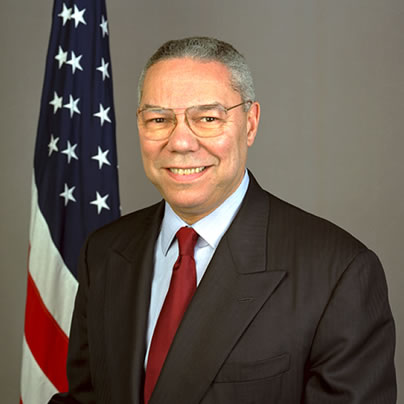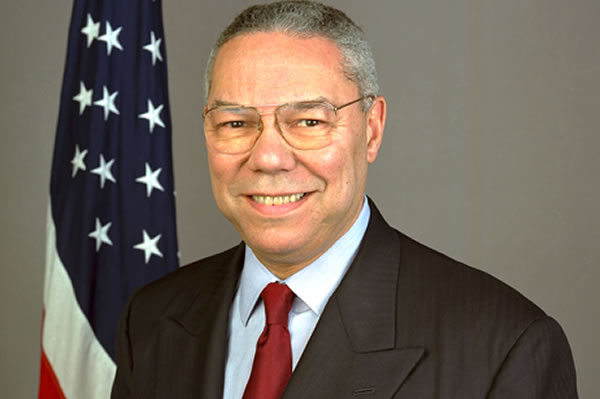National
Powell defends Hagel on ‘Meet the Press’ over anti-gay remarks
Former JCS chair says nominee will fully implement ‘Don’t Ask’ repeal


Former Secretary of State Colin Powell defended Chuck Hagel on “Meet the Press” over his 1998 anti-gay remarks (photo public domain)
Former Chair of the Joint Chiefs of Staff Gen. Colin Powell defended Chuck Hagel on Sunday over anti-gay remarks the former senator made in 1998, saying the defense secretary nominee would ensure “Don’t Ask, Don’t Tell” repeal is fully implemented upon confirmation.
During an interview on NBC’s “Meet the Press,” Powell — who served as Secretary of State under former President George W. Bush — advocated for Hagel as defense secretary based on the Nebraska Republican’s public service and contribution to the Vietnam War while mitigating concerns expressed over the nominee by Jewish groups and others.
Host David Gregory brought up the 1998 remarks to the Omaha World-Herald in which Hagel called then-ambassadorial nominee James Hormel “aggressively gay” and said that would detract from his effectiveness overseas. Gregory also noted Hagel recently apologized for those comments in a statement that expressed a commitment to LGBT military families.
Powell at first interrupted Gregory, saying “the apology has been accepted by the ambassador.” While Hormel accepted the apology in a Facebook posting and expressed a forgiving tone in a subsequent interview with the San Francisco Chronicle, Hormel initially questioned the sincerity of the Hagel’s mea culpa — which came 14 years after the fact — in interviews with the Washington Post and the Washington Blade.
But Gregory continued to question Powell about whether Hagel would continue the implementation of “Don’t Ask. Don’t Tell” repeal at a time when gay troops lack certain partner benefits. LGBT advocates have been pressing for a secretarial directive to grant benefits to gay troops, such as joint duty assignments, issuance of military IDs, use of the commissary and family housing.
Powell at first seemed unaware about any outstanding issues in the wake of repeal of the military’s gay ban, saying “‘Don’t Ask, Don’t Tell’ isn’t there any more. It doesn’t have to reverse. It’s gone.”
But Powell added Hagel will fully implement the “Don’t Ask, Don’t Tell” repeal in a way that is consistent with the administration’s position — and will make that position known during his upcoming confirmation hearings before the Senate — while saying the former senator would be “responsible” upon confirmation for ensuring gay service members have a “proper environment” to perform their duties.
“I think that what Sen. Hagel will do — as he has said, and as he will certainly testify at the confirmation hearing — is that he will fully implement ‘Don’t Ask, Don’t Tell’ [repeal,]” Powell said. “There are still issues that have to be resolved, but, I think, he will go after these issues in a way that will be very consistent with the administration’s position, with the law and with the aspirations of our gay and lesbian men and women in the military. He is now responsible for them, he is now responsible for them having a proper environment in which to do their jobs. And that will include making sure that ‘Don’t Ask, Don’t Tell,’ and the elimination of ‘Don’t Ask, Don’t Tell’ is fully implemented.”
Zeke Stokes, a spokesperson for the LGBT military group OutServe-SLDN, expressed satisfaction with Powell’s remarks on “Meet the Press” in an email to the Blade.
“Gen. Powell’s comments are of course encouraging and indeed in line with what we would expect should Sen. Hagel be confirmed,” Stokes said.
Powell’s remarks on LGBT issues have drawn considerable notice because of his status as a moderate Republican and military leader. A proponent of “Don’t Ask, Don’t Tell” when the law was first proposed in 1993, Powell subsequently reversed that position and endorsed the process set up by the Pentagon leading to its repeal. Powell has also come out in favor of marriage rights for same-sex couples.

The Comings & Goings column is about sharing the professional successes of our community. We want to recognize those landing new jobs, new clients for their business, joining boards of organizations and other achievements. Please share your successes with us at [email protected].
Congratulations to Gil Pontes III on his recent appointment to the Financial Advisory Board for the City of Wilton Manors, Fla. Upon being appointed he said, “I’m honored to join the Financial Advisory Board for the City of Wilton Manors at such an important moment for our community. In my role as Executive Director of the NextGen Chamber of Commerce, I spend much of my time focused on economic growth, fiscal sustainability, and the long-term competitiveness of emerging business leaders. I look forward to bringing that perspective to Wilton Manors — helping ensure responsible stewardship of public resources while supporting a vibrant, inclusive local economy.”
Pontes is a nonprofit executive with years of development, operations, budget, management, and strategic planning experience in 501(c)(3), 501(c)(4), and political organizations. Pontes is currently executive director of NextGen, Chamber of Commerce. NextGen Chamber’s mission is to “empower emerging business leaders by generating insights, encouraging engagement, and nurturing leadership development to shape the future economy.” Prior to that he served as managing director of The Nora Project, and director of development also at The Nora Project. He has held a number of other positions including Major Gifts Officer, Thundermist Health Center, and has worked in both real estate and banking including as Business Solutions Adviser, Ironwood Financial. For three years he was a Selectman, Town of Berkley, Mass. In that role, he managed HR and general governance for town government. There were 200+ staff and 6,500 constituents. He balanced a $20,000,000 budget annually, established an Economic Development Committee, and hired the first town administrator.
Pontes earned his bachelor’s degree in political science from the University of Massachusetts, Dartmouth.
Kansas
ACLU sues Kansas over law invalidating trans residents’ IDs
A new Kansas bill requires transgender residents to have their driver’s licenses reflect their sex assigned at birth, invalidating current licenses.

Transgender people across Kansas received letters in the mail on Wednesday demanding the immediate surrender of their driver’s licenses following passage of one of the harshest transgender bathroom bans in the nation. Now the American Civil Liberties Union is filing a lawsuit to block the ban and protect transgender residents from what advocates describe as “sweeping” and “punitive” consequences.
Independent journalist Erin Reed broke the story Wednesday after lawmakers approved House Substitute for Senate Bill 244. In her reporting, Reed included a photo of the letter sent to transgender Kansans, requiring them to obtain a driver’s license that reflects their sex assigned at birth rather than the gender with which they identify.
According to the reporting, transgender Kansans must surrender their driver’s licenses and that their current credentials — regardless of expiration date — will be considered invalid upon the law’s publication. The move effectively nullifies previously issued identification documents, creating immediate uncertainty for those impacted.
House Substitute for Senate Bill 244 also stipulates that any transgender person caught driving without a valid license could face a class B misdemeanor, punishable by up to six months in jail and a $1,000 fine. That potential penalty adds a criminal dimension to what began as an administrative action. It also compounds the legal risks for transgender Kansans, as the state already requires county jails to house inmates according to sex assigned at birth — a policy that advocates say can place transgender detainees at heightened risk.
Beyond identification issues, SB 244 not only bans transgender people from using restrooms that match their gender identity in government buildings — including libraries, courthouses, state parks, hospitals, and interstate rest stops — with the possibility for criminal penalties, but also allows for what critics have described as a “bathroom bounty hunter” provision. The measure permits anyone who encounters a transgender person in a restroom — including potentially in private businesses — to sue them for large sums of money, dramatically expanding the scope of enforcement beyond government authorities.
The lawsuit challenging SB 244 was filed today in the District Court of Douglas County on behalf of anonymous plaintiffs Daniel Doe and Matthew Moe by the American Civil Liberties Union, the ACLU of Kansas, and Ballard Spahr LLP. The complaint argues that SB 244 violates the Kansas Constitution’s protections for personal autonomy, privacy, equality under the law, due process, and freedom of speech.
Additionally, the American Civil Liberties Union filed a temporary restraining order on behalf of the anonymous plaintiffs, arguing that the order — followed by a temporary injunction — is necessary to prevent the “irreparable harm” that would result from SB 244.
State Rep. Abi Boatman, a Wichita Democrat and the only transgender member of the Kansas Legislature, told the Kansas City Star on Wednesday that “persecution is the point.”
“This legislation is a direct attack on the dignity and humanity of transgender Kansans,” said Monica Bennett, legal director of the ACLU of Kansas. “It undermines our state’s strong constitutional protections against government overreach and persecution.”
“SB 244 is a cruel and craven threat to public safety all in the name of fostering fear, division, and paranoia,” said Harper Seldin, senior staff attorney for the ACLU’s LGBTQ & HIV Rights Project. “The invalidation of state-issued IDs threatens to out transgender people against their will every time they apply for a job, rent an apartment, or interact with police. Taken as a whole, SB 244 is a transparent attempt to deny transgender people autonomy over their own identities and push them out of public life altogether.”
“SB 244 presents a state-sanctioned attack on transgender people aimed at silencing, dehumanizing, and alienating Kansans whose gender identity does not conform to the state legislature’s preferences,” said Heather St. Clair, a Ballard Spahr litigator working on the case. “Ballard Spahr is committed to standing with the ACLU and the plaintiffs in fighting on behalf of transgender Kansans for a remedy against the injustices presented by SB 244, and is dedicated to protecting the constitutional rights jeopardized by this new law.”
National
After layoffs at Advocate, parent company acquires ‘Them’ from Conde Nast
Top editorial staff let go last week

Former staff members at the Advocate and Out magazines revealed that parent company Equalpride laid off a number of employees late last week.
Those let go included Advocate editor-in-chief Alex Cooper, Pride.com editor-in-chief Rachel Shatto, brand partnerships manager Erin Manley, community editor Marie-Adélina de la Ferriére, and Out magazine staff writers Moises Mendez and Bernardo Sim, according to a report in Hollywood Reporter.
Cooper, who joined the company in 2021, posted to social media that, “Few people have had the privilege of leading this legendary LGBTQ+ news outlet, and I’m deeply honored to have been one of them. To my team: thank you for the last four years. You’ve been the best. For those also affected today, please let me know how I can support you.”
The Advocate’s PR firm when reached by the Blade said it no longer represents the company. Emails to the Advocate went unanswered.
Equalpride on Friday announced it acquired “Them,” a digital LGBTQ outlet founded in 2017 by Conde Nast.
“Equalpride exists to elevate, celebrate and protect LGBTQ+ storytelling at scale,” Equalpride CEO Mark Berryhill said according to Hollywood Reporter. “By combining the strengths of our brands with this respected digital platform, we’re creating a unified ecosystem that delivers even more impact for our audiences, advertisers, and community partners.”
It’s not clear if “Them” staff would take over editorial responsibilities for the Advocate and Out.















